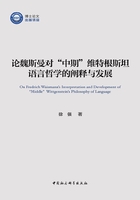第五节 本章小结
本章是本书整体内容的导言,探讨了研究主题文献综述、研究问题和研究框架。有关维特根斯坦和魏斯曼哲学互动研究应该考虑到三个主体:维特根斯坦哲学研究、维也纳小组研究、魏斯曼研究工作重要性和必要性。本书指出,当前从延续性视角考察维特根斯坦哲学是项艰巨而又具有重要意义的工程。正是在延续性视角中,“中期”维特根斯坦哲学的重要性得到了凸显;“中期”维特根斯坦哲学研究的重要方面就是维特根斯坦与维也纳小组成员的互动;从维也纳小组研究来说,对逻辑经验主义源头的回归和“个体式”研究视角转变为魏斯曼的研究提供了理据和视角。因此,本书从魏斯曼角度来考察“中期”维特根斯坦哲学,不仅顺应了上述研究主题研究趋势,同时也是对上述研究工作的进一步拓展与深化。
[1]Baker P.Gordon,“Verehrung und Verkehrung Waismann and Wittgenstein”,in C.G.Luckhardt,ed.,Wittgenstein Sources and Perspectives,Ithaca: Cornell University Press,1979,pp.243-286.Baker P.Gordon,“Friedrich Waismann: A Vision of Philosophy”,Philosophy,No.783,2003(a),pp.163-179.
[2]在很多情况下,“维也纳小组”和“逻辑经验主义”可互换,区别主要在于:“维也纳小组”突出了该小组的发源地,“逻辑经验主义”突出了该小组的代表思想。也有学者把维也纳小组哲学称为“逻辑实证主义”,例如费格。本书按照维也纳小组中国成员洪谦的一贯用法,把维也纳小组的哲学称为“逻辑经验主义”。Blumberg A.E.and Feigl Herbert,“Logical Positivism—A New Movement in European Philosophy”,The Journal of Philosophy,Vol.28,No.11,1931,pp.281-296.洪谦:《论逻辑经验主义》,商务印书馆2014年版。
[3]Stadler Friedrich,The Vienna Circle: Studies in the Origins,Development,and Influence of Logical Empiricism,Cham/Heidelberg/New York/Dordrecht/London: Springer,2015,pp.577-588.
[4]Neurath Marie and Cohen S.Robert,eds.,Otto Neurath: Empiricism and Sociology,Boston:D.Reidel Publishing Company,1973.
[5]“哲理庐”:“逻辑经验主义是一种存在主义”,https: //mp.weixin.qq.com/s/Vyp8v6SDhU932iY9MD8ptA,2019年12月12日。
[6][美]卡尔·亨普尔:《关于认知意义的经验主义标准:问题与变化》,载马蒂尼奇《语言哲学》,商务印书馆1998年版,第16—39页。
[7][美]威拉德·蒯因:《经验主义的两个教条》,载马蒂尼奇《语言哲学》,商务印书馆1998年版,第39—66页。
[8]Michael Friedman,“The Re-evaluation of Logical Positivism”,The Journal of Philosophy,Vol.88,No.10,1991,p.507.
[9]Carnap Rudolf,The Unity of Science,London: Kegan Paul Trench and Teubner Company,1934,pp.21-22.
[10]江怡:《维也纳小组在中国的命运》,《世界哲学》2009年第6期。
[11]洪谦:《艾耶尔和逻辑经验主义》,《哲学研究》1991年第1期;洪谦、还学文:《关于逻辑经验主义——我的个人见解》,《哲学译丛》1978年第5期;洪谦、纪树立:《论“断定”》,《哲学研究》1986年第4期;洪谦:《关于逻辑经验论的几个问题》,《自然辩证法通讯》1989年第1期。
[12]Stadler Friedrich,The Vienna Circle: Studies in the Origins,Development,and Influences of Logical Positivism,Wien:Springer-Verlag,2001,p.226.Kraft Victor,The Vienna Circle,New York:Philosophical Library,1953,p.9.
[13]江天骥:《五十年来的科学哲学——从逻辑经验主义到历史主义》,《江汉论坛》1989年第4期;江天骥:《五十年来的科学哲学——从逻辑经验主义到历史主义》,《江汉论》1989年第5期;江天骥、段秀芳:《可证伪性、可批评性和科学方法》,《世界哲学》2007年第2期;江天骥:《西方科学哲学的新趋向——最近几十年来的科学哲学(1951—现在)》,《自然辩证法通讯》2000年第4期;江天骥:《语言用法与意义、理论的证实或反驳、观察和科学基础》,《自然辩证法通讯》1999年第4期;江天骥:《论逻辑经验主义的认识论》,武汉大学出版社2009年版;江天骥:《当代西方科学哲学》,武汉大学出版社2009年版,第108—142页。
[14]陈荣:《维特根斯坦对石里克哲学思想的影响分析》,《内蒙古农业大学学报》(社会科学版)2011年第6期。
[15]V.A.and Shanker S.G.,eds.,Ludwig Wittgenstein: Critical Assessments.Volume Five:A Wittgenstein Bibliography,London/Sydney/Wolfeboro/New Hampshire:Croom Helm,1986,pp.31-345.
[16]Moyal-Sharrock Daniéle,“Introduction: The Idea of A Third Wittgenstein”,in Moyal-Sharrock Daniéle,ed.,The Third Wittgenstein: the Post-Investigation Works,Hampshire:Ashgate,2004,pp.1-13.
[17]Biletzki Anat,(Over)interpreting Wittgenstein,Dordrecht: Kluwer Academic Publishers,2003.
[18]Hacker M.S.Peter,“Wittgenstein on Grammar,Theses and Dogmatism”,Philosophical Investigations,Vol.35,2012,pp.1-17.
[19]Hutchinson Phil,“What's the Point of Elucidation?”Metaphilosophy,Vol.38,2007,p.691.
[20]Hutchinson Phil,“What's the Point of Elucidation?”Metaphilosophy,Vol.38,2007,p.691.
[21]Zhang Xueguang,“Wittgenstein in China”,Philosophical Investigations,Vol.38,No.3,2015,pp.199-226.
[22]Baker P.Gordon,“Verehrung und Verkehrung: Waismann and Wittgenstein”,in C.G.Luckhardt,ed.,Wittgenstein: Sources and Perspectives,Ithaca: Cornell University Press,1979,pp.243-286.Baker P.Gordon,“Friedrich Waismann: A Vision of Philosophy”,Philosophy,Vol.783,2003,pp.163-179.
[23]Butler J.Ronald,“Language Strata and Alternative Logics”,Australasian Journal of Philosophy,Vol.33,No.2,1955,pp.77-87.
[24]Bakhale S.W.,“Relation of Body-mind statements”,Indian Philosophical Quarterly,Vol.1,1974,pp.154-160.
[25]Hart H.L.A.,The Concept of Law,Oxford:Clarendon Press,1961.[英]哈特:《法律的概念》,许家馨等译,法律出版社2011年版。
[26]Brian Bix,“H.L.A.Hart and the‘Open Texture' of Language”,Law and Philosophy,Vol.10,No.1,1991,pp.51-72.
[27]McGuinness F.Brian,ed.,Friedrich Waismann-Causality and Logical Positivism,Springer/Dordrecht/Heidelberg/London/New York:Springer,2011.
[28]Davis Steven,Book Review of“Principles of Linguistic Philosophy”,Dialogue,Vol.6,1968,pp.596-603.
[29]Harre Rom,ed.,The Principle of Linguistic Philosophy,Glasgow/London: The University Press,1965,p.xi.
[30]Waismann Fredrich,“How I See Philosophy”,in Harre Rom,ed.,How I See Philosophy,New York:St.Martin's Press,1968,p.21.
[31]Prior N.Arthur,“Contemporary British Philosophy”,Philosophy,Vol.33,No.127,1958,pp.361-364.
[32]Jha Shri Anirudha,“Linguistic Analysis—A Bankrupt Philosophy”,The Philosophical Quarterly,1960,pp.49-57.
[33]Hacker M.S.Peter,“Gordon Baker's Later Interpretation of Wittgenstein”,in Kahane Guy,Kanterian Edward and Kuusela Oskari,eds.,Wittgenstein and His Interpreters:Essays in Memory of Gordon Baker,Oxford:Blackwell Publishing Ltd.,2007,p.93.
[34]McGuinness F.Brian,“Waismann: The Wandering Scholar”,in McGuinness F.Brian,ed.,Friedrich Waismann-Causality and Logical Positivism,Springer/Dordrecht/Heidelberg/London/New York:Springer,2011,pp.9-17.
[35]Schulte Joachim,“Waismann as Spokesman for Wittgenstein”,in McGuinness F.Brian,ed.,Friedrich Waismann-Causality and Logical Positivism,Springer/Dordrecht/Heidelberg/London/New York:Springer,2011,pp.223-241.
[36]Manninen Juha,“Waismann's Testimony of Wittgenstein's Fresh Starts in 1931 -1935”,in McGuinness F.Brian,ed.,Friedrich Waismann-Causality and Logical Positivism,Springer/Dordrecht/Heidelberg/London/New York:Springer,2011,pp.243-265.
[37]Sandis Constantine,“Producing A Justification:Waismann on Ethics and Science”,in Makovec Dejan and Shapiro Stewart,eds.,Friedrich Waismann:The Open Texture of Analytic Philosophy,Cham:Palgrave Macmillan,2019,pp.47-67.
[38]Schroeder Severin and Tomany Harry,“Friedrich Waismann's Philosophy of Mathematics”,in Makovec Dejan and Shapiro Stewart,eds.,Friedrich Waismann: The Open Texture of Analytic Philosophy,Cham:Palgrave Macmillan,2019,pp.67-88.
[39]Coliva Annalisa,“Waismann on Belief and Knowledge”,in Makovec Dejan and Shapiro Stewart,eds.,Friedrich Waismann: The Open Texture of Analytic Philosophy,Cham:Palgrave Macmillan,2019,pp.89-106.
[40]Morris J.Katherine,“‘How I See Philosophy':An Apple of Discord Among Wittgenstein Scholars”,in Makovec Dejan and Shapiro Stewart,eds.,Friedrich Waismann: The Open Texture of Analytic Philosophy,Cham:Palgrave Macmillan,2019,pp.107-131.
[41]Makovec Dejan and Shapiro Stewart,eds.,Friedrich Waismann: The Open Texture of Analytic Philosophy,Cham:Palgrave Macmillan,2019,pp.131-211.
[42]Bix Brian,“Waismann,Wittgenstein,Hart,and Beyond: The Developing Idea of‘Open Texture' of Language and Law”,in Makovec Dejan and Shapiro Stewart,eds.,Friedrich Waismann: The Open Texture of Analytic Philosophy,Cham: Palgrave Macmillan,2019,pp.245-261.
[43]Heuer Ulrike,“Motives and Interpretations”,in Makovec Dejan and Shapiro Stewart,eds.,Friedrich Waismann: The Open Texture of Analytic Philosophy,Cham: Palgrave Macmillan,2019,pp.279-295.
[44]Priest Graham,“Waismann on Fiction and Its Objects”,in Makovec Dejan and Shapiro Stewart,eds.,Friedrich Waismann: The Open Texture of Analytic Philosophy,Cham:Palgrave Macmillan,2019,pp.295-314.
[45]Williamson Timothy,Vagueness,London:Routledge,1994.
[46]Shapiro Stewart,Vagueness in Context,Oxford:Oxford University Press,2006.
[47]Wilson Mark,Wandering Significance,Oxford:Oxford University Press,2006.
[48]Yablo Stephen,Thoughts:Papers on Mind,Meaning,and Modality,Oxford: Oxford University Press,2008.
[49]Chalmers David,Constructing the World,Oxford:Oxford University Press,2012.
[50]Machery Edouard,Philosophy Within Its Proper Bounds,Oxford: Oxford University Press,2017.
[51]Makovec Dejan,“Introduction:Waismann's Rocky Strata”,in Makovec Dejan and Shapiro Stewart,eds.,Friedrich Waismann: The Open Texture of Analytic Philosophy,Cham:Palgrave Macmillan,2019,pp.8-9.
[52]Morris J.Katherine,“‘How I See Philosophy':An Apple of Discord Among Wittgenstein Scholars”,in Makovec Dejan and Shapiro Stewart,eds.,Friedrich Waismann: The Open Texture of Analytic Philosophy,Cham:Palgrave Macmillan,2019,pp.107-131.
[53]Eugen Fischer,“Linguistic Legislation and Psycholinguistic Experience:Redeveloping Waismann's Approach”,in Makovec Dejan and Shapiro Stewart,eds.,Friedrich Waismann:The Open Texture of Analytic Philosophy,Cham:Palgrave Macmillan,2019,pp.211-245.
[54]Limbeck-Lilienau Christoph,“Waismann in the Vienna Circle”,in Makovec Dejan and Shapiro Stewart,eds.,Friedrich Waismann: The Open Texture of Analytic Philosophy,Cham:Palgrave Macmillan,2019,pp.29-46.
[55][奥]弗里德里希·魏斯曼:《语言层次》,李真译,载洪谦主编《逻辑经验主义》(上卷),商务印书馆1982年版,第211—233页。
[56]王晓阳:《从私人语言论证到物理主义纲领:维特根斯坦与维也纳学派》,《学术月刊》2014年第11期。
[57]韩林合:《维特根斯坦〈哲学研究〉解读》(上、下册),商务印书馆2010年版。
[58]徐英瑾:《维特根斯坦哲学转型期中的“现象学”之谜》,复旦大学出版社2005年版。
[59][奥]路德维希·维特根斯坦:《维特根斯坦与维也纳小组》,徐为民等译,同济大学出版社2005年版。
[60]王健平:《语言层次理论与现代逻辑和科学的发展》,《学术研究》2006年第8期。
[61]王堃:《自然语言层次的伦理政治效应:荀子“正名”伦理学的元语言研究》,中国文联出版社2018年版。
[62]林孝文:《语言、法律与非确定性——哈特的法官自由裁量权理论研究》,《中南民族大学学报》(人文社会科学版)2015年第2期。
[63]李晓飞:《法律的规范性解析》,《东南大学学报》(哲学社会科学版)2015年第S1期。
[64]胡欣诣:《反证实主义的“证实主义”——新分析法学哲学品格辨析》,《哲学分析》2017年第8期。
[65]Anscombe G.Elizabeth,An Introduction to Wittgenstein's Tractatus,London:Hutchinson University Library,1959.
[66]Black Max,A Companion to Wittgenstein's Tractatus,Ithaca NY:Cornell University Press,1964.
[67]韩林合:《〈逻辑哲学论〉研究》,商务印书馆2007年版。
[68]韩林合:《维特根斯坦〈哲学研究〉解读》(上、下册),商务印书馆2010年版。
[69]Schulte Joachim,“Waismann As Spokesman for Wittgenstein”,in McGuinness F.Brian,ed.,Friedrich Waismann—Causality and Logical Positivism,Springer/Dordrecht/Heidelberg/London/New York:Springer,2011,pp.223-241.
